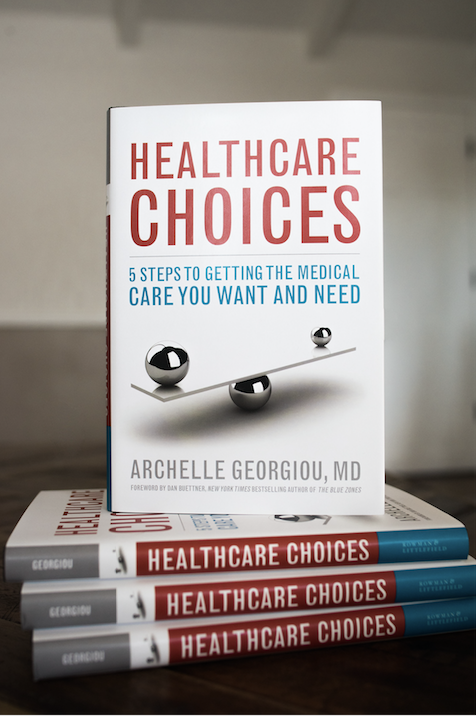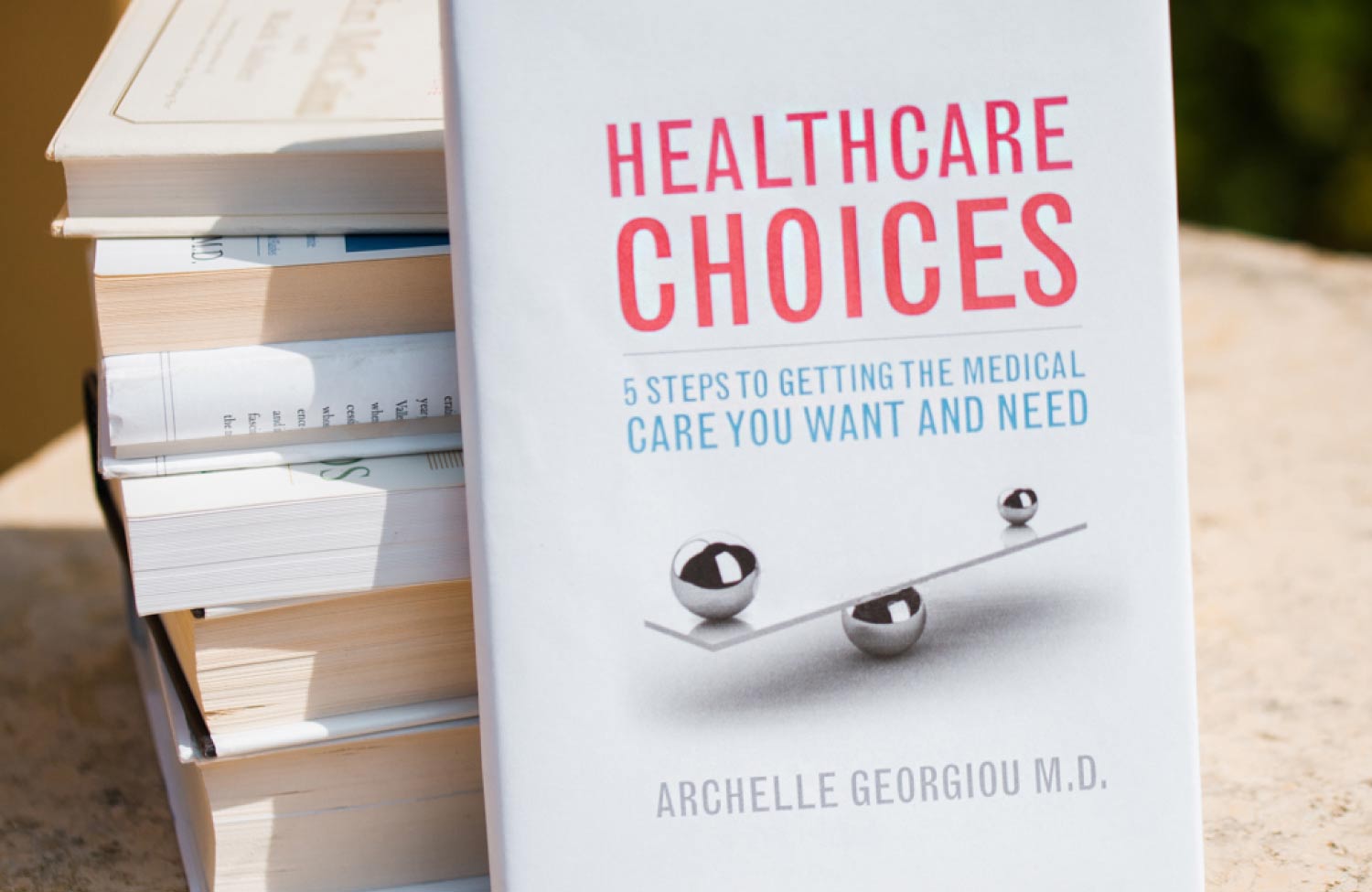In the first of a two-part blog series entitled Conversations with Revel’s CEO, Jeff Fritz talks with Archelle Georgiou, MD, a nationally recognized physician, consumer advocate and healthcare author.
As former Chief Medical Officer of UnitedHealthcare, Dr. Archelle Georgiou changed the company’s policies and eliminated the bureaucratic hassles that the managed care company imposed on patients and physicians. She uses the media as a vehicle to educate consumers about their health and has a regular health news segment on KSTP-TV in Minneapolis.
Archelle is the author of Healthcare Choices: 5 Steps to Getting the Medical Care You Want and Need and is the Industry Advisor for the Medical Industry Leadership Institute at the University of Minnesota Carlson School of Management.
Jeff sat down recently to talk with Dr. Georgiou about one of her favorite topics – data driven healthcare. A self-professed “data geek”, Dr. Georgiou believes that consumers, along with providers and healthcare plans, have huge opportunities to drive better health care outcomes by learning how to use and incorporate good data into their decision-making processes.
Jeff Fritz: Thanks so much for coming over to Revel today! I know that improving the use of data in healthcare is one of your passions. But I think it would be helpful to talk about the trend that’s really driving a lot of the interest in using data. Can you describe how you’ve seen healthcare consumerism trending over the past few years?
Archelle Georgiou: Actually it’s been a trend over the past 30 years, so it’s helpful to think about it by decade. In the 1990’s, you couldn’t put the words “consumers” and “healthcare” into the same sentence – it would have been an oxymoron.
But by the early 2000’s we began to see healthcare flavored by consumerism. People began to obtain information from the internet, so that information was “democratized” so to speak. They became much more informed.
By 2010 or so, consumers realized not only could they gather the information but they could use that information to make choices. So we went from no information, to more information and finally where we are now…to being empowered by that information.
JF: Interesting, I hadn’t thought about it from the aspect of a timeline. Obviously, there have been factors driving this trend beyond just the internet. What are the main things that have accelerated healthcare consumerism?
AG: You’re right, there have been a number of factors. Recognizing that we could capture, catalog and use data was a huge revelation. UnitedHealthcare was the first health plan that introduced physician report cards and HEDIS which helped us realize that data was incredibly powerful.
As I mentioned before, technology really democratized the distribution of information, and made it so much more accessible. But the cost shifting that has occurred since the early 2000’s has made an enormous impact as well. The introduction of consumer driven healthplans, and then the HSA’s and HRA’s of course, led to cost shifting and cost sharing between employers and individuals. The fact that high deductibles created more out of pocket expenses made people responsible for the cost of their care. And with technology and transparency, the cost of care became visible as well. These had tremendous impacts on healthcare consumerism.
Finally, I think the ACA really helped accelerate the trend as for the first time people could buy their own insurance without so many barriers. That’s driven up consumer “thinking” quite a bit.
JF: It’s so interesting to see the impacts from all these factors on consumers, as well as health plans and providers. And the demand for data continues to accelerate. But that makes me think about the challenge of interoperability. There are still many silos of information that keep providers and plans from managing and using data to its best advantage. But is that the biggest problem you see? What do you worry about?
AG: I see that there are silos and interoperability issues but I think they can be overcome, and I don’t think they’re the biggest barrier. I actually am more concerned about three things. First, that the goals for patients, providers and plans aren’t aligned. The reasons and the ways each uses data is completely different, as is the definition of the word quality. There’s no common definition of quality, or appropriate cost, for that matter, across the major stakeholders in the system. It’s a huge issue.
Next, I think there’s a continuous tension around individual versus population-based care, and that’s another obstacle to using data effectively. For example, if a high cholesterol can be treated in 90% of the population with a generic medication, what happens to the 10% for whom that medication doesn’t work. Health plans manage care – but are they managing people? And should they? We are all individuals and an “n” sample of 1. This is why people really need to be good advocates for themselves. Unfortunately, it’s not easy to navigate this system.
Finally, one area I don’t think people really think enough about is that we simply don’t have enough talent that knows how to manage and use data. There’s a huge healthcare analytics and healthcare IT talent gap.
Cade Metz at the New York Times wrote a great article that highlighted how the number of jobs in IT is far larger than the number of graduates. The UHG Foundation just gave a $1.2 million grant to the Medical Industry Leadership Institute to create a larger pipeline of talent for data analytics.
We don’t have enough people that know data, and we also don’t have enough talented people that know how to communicate the value of that data. It’s a big problem.
JF: I agree. Recruiting talent for Revel has been a challenge, but it’s making us become much more competitive in terms of not only the salaries we offer, but the culture and benefits we provide.
I think we also need to think of it as a shift around data, or around the idea of “quality” where data is concerned. We need to move from what the government says needs to happen, and that “check the box” mentality. We’ve got to focus on activities that are high quality, actually usable and of course actionable. The biggest driver to me is cost. The cost is so painful now for everyone – consumers, plans and providers – that we need to do something different and I believe doing something different with data is the answer. There’s a huge pivot happening.
AG: You’re right. Money drives a lot of behavior.
JF: Given the obstacles you described above, I’m interested in your perspective as a physician, former CMO and now an industry advocate and author. How does healthcare leadership need to change in terms of both philosophy and practice to meet the needs of the new healthcare consumer?
AG: Really, it’s all about supporting the healthcare consumer make good decisions, and good buying decisions. Despite all the healthcare apps out there, we still don’t see people as engaged in their case as much as they should be.Studies tell us that 90% of consumers say they want to be actively engaged, but only 65% actually demonstrate that behavior. When they get seriously ill, what I’ve noticed empirically is that they take an even less active role in their care.
I believe that we need to recognize better ways to empower consumers, and it’s not about more apps or more data. We need a shift in the healthcare culture, just as you described, and we can learn from the world of financial management. A financial advisor can only create an investment plan after a client shares their goals, priorities, and the amount of investment risk they are willing to take.
So let’s move to healthcare. A doctor, or clinician needs to understand that patients need to articulate their goals, priorities, and propensity for risk. How do we build a healthcare system that builds those steps of discovery into the process of providing care? Sometimes I think we need “health management advisors” just like we have wealth advisors.
JF: I agree, but in the finance industry the shift involved a change in regulations. Planners had to disclose how they were being compensated. In healthcare, plans have historically competed first on how they manage risk, and second on how they care for their members. If they were absolved from having to manage some of that higher risk, they could focus more on how they treat the patient.
AG: Jeff, insurance companies are just financing organizations. They’re there to calculate and manage risk. They are not there to deliver care. We need to separate those two functions to create better checks and balances while, at the same time, establishing a standard definition of the term “quality” for all stakeholders.
This conversation continues in next week’s blog “The Promise of Data Driven Healthcare – Part Two.”





